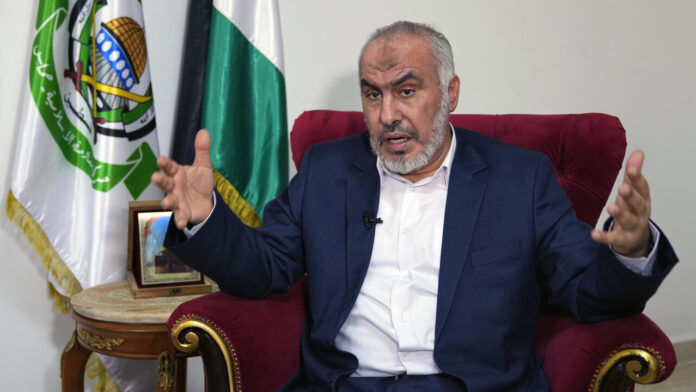First Public Appearance Since Assassination Attempt
Senior Hamas official Ghazi Hamad broke his silence this week, speaking on Qatar’s Al Jazeera network for the first time since surviving an Israeli airstrike in Doha. The appearance marked Hamad’s first public statement following the dramatic September 9 attack, which Israeli forces launched in an attempt to eliminate top Hamas leaders on Qatari soil.
Hamad confirmed that the strike, part of an operation reportedly codenamed “Summit of Fire,” failed to achieve its objective. “We were engaged in discussions with the negotiation team and some advisors,” Hamad told Al Jazeera. “Less than an hour after we began analyzing the American proposal from the Qatari mediators, we were startled by loud explosions.”
Inside the September 9 Attack

According to Hamad, roughly a dozen missiles struck the compound where he and other senior Hamas officials were meeting to discuss a U.S.-backed ceasefire initiative. The airstrike lasted under a minute but caused significant casualties and destruction.
Present at the meeting were several high-profile Hamas leaders, including chief negotiator Khalil al-Hayya, former Hamas political bureau chief Khaled Meshaal, and West Bank commander Zaher Jabarin. Despite the intensity of the attack, all senior leaders survived.
Tragically, the strike claimed the lives of six individuals, including al-Hayya’s son Humam and a Qatari security officer. Hamad said their familiarity with Israeli military tactics helped them react quickly. “Living in Gaza, we have experienced Israeli bombardments before,” he explained, adding that the group immediately identified the sounds of incoming missiles and evacuated to safety.
Qatar Condemns Strike, Halts Mediation Role
The unprecedented attack has escalated tensions in the region. Qatar, which has served as a key mediator in ceasefire negotiations, called the strike a “flagrant violation of international law” and has since suspended its mediation efforts. The Gulf nation hosts the Al-Udeid Air Base, a critical hub for U.S. military operations in the Middle East, making the strike a significant diplomatic flashpoint.
Regional analysts warn that the attack may derail ongoing ceasefire efforts and further destabilize negotiations. The timing was particularly sensitive, as Arab and Islamic leaders were gathering to discuss a unified response to Israel’s actions in Gaza.
Hamad Criticizes U.S. Role in Negotiations
During his Al Jazeera appearance, Hamad sharply criticized Washington’s mediation efforts, describing them as inconsistent and biased. He claimed that U.S. officials had repeatedly backtracked on their own proposals and accused them of siding with Israel’s military campaign.
“Our experience with American mediation has been bitter,” Hamad said. “They are partners in the ongoing crimes against our people.”
Hamad also dismissed recent warnings from former U.S. President Donald Trump, who had condemned Hamas’s handling of hostages and expressed frustration that the Israeli strike did not eliminate Hamas leaders. “Trump does not intimidate us,” Hamad declared, insisting that Hamas treats captives “according to our values” despite what he called “massacres against our people.”
Impact on Regional Diplomacy
The attack has created a new layer of tension between Israel and Qatar, a country considered an important U.S. ally in the Gulf region. Diplomatic observers say the strike could complicate efforts to maintain dialogue between Hamas and international mediators, particularly as negotiations over hostages and ceasefire arrangements remain deadlocked.
The incident also raises questions about the security of foreign political leaders operating in Qatar, a nation that has traditionally hosted negotiations between rival factions. Analysts warn that future talks may be jeopardized if participants feel unsafe, potentially prolonging the conflict in Gaza.
Outlook: Uncertain Path Ahead
For now, Hamas leaders remain defiant, framing their survival as a symbolic victory. Hamad’s public reappearance appears designed to send a message of resilience to both supporters and adversaries.
With Qatar temporarily stepping back from its mediation role, diplomatic efforts face a major setback. International pressure is likely to increase on both Israel and Hamas to resume talks, but the strike has deepened mistrust on all sides.
Whether negotiations can recover from this event remains uncertain. What is clear is that the September 9 attack has not only failed to achieve its immediate objective but has also reshaped the political landscape in a region already on edge.
Sources: Al Jazeera


